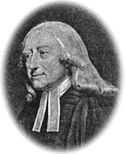Albert Outler
Albert Cook Outler (November 17, 1908 – September 1, 1989) was a 20th-century American Methodist theologian and philosopher. Outler is generally considered to be one of the most important Wesley scholars in the history of the Church as well as the first real United Methodist theologian. He was also a key figure in the 20th century ecumenical movement.
Outler was born and raised in Georgia and was an ordained Methodist Elder who served in several appointments. He graduated from Wofford College and received his Ph.D. degree from Yale University, teaching at both Yale and Duke University before beginning a long tenure at Southern Methodist University in Texas. He was a delegate to Consultation on Church Union, served on the Faith & Order board of the World Council of Churches and was an official observer at the Second Vatican Council.
Outler is widely credited with being the first to recognize John Wesley's method for theologizing, via what Outler referred to as the Wesleyan Quadrilateral: Scripture, Church Tradition, Reason, and Personal Experience. This understanding of Wesleyan theology is prevalent throughout Methodism, particularly in The United Methodist Church. Using this model, Outler was a key figure in organizing the theological statement put forth by The United Methodist Church after its formation in 1968.
With his many references to the early Church, Outler's work has proven very influential to those in the paleo-orthodox movement and contemporary evangelicalism, notably Thomas C. Oden.
Albert Outler wrote and edited a great many works. Many of his writings have been collected in the Albert Outler Library series by Bristol House publishers.
Key works
- Albert Outler: The Churchman (ISBN 1-885224-02-8)
- Albert C. Outler: The Gifted Dilettante by Bob W. Parrott (ISBN 1-885224-28-1), a definitive biography
- Albert Outler: The Historian & Interpreter of the Christian Tradition
- Albert Outler on the Holy Spirit: The Pneumatology of Albert Cook Outler
- Albert Outler: The Preacher (ISBN 0-687-00950-2), a collection of sermons
- Albert Outler: The University Professor (ISBN 1-885224-03-6)
- Christology (ISBN 1-885224-08-7)
- The Ecumenical Theologian (ISBN 1-885224-35-4)
- Evangelism
- Evangelism & Theology in the Wesleyan Spirit (ISBN 0-88177-151-1), a synthesis of Wesleyan thought
- John Wesley (ISBN 0-19-502810-4), considered perhaps the finest one volume introduction to Wesley
- The Pastoral Psychology of Albert C. Outler (ISBN 1-885224-11-7)
- The Works of John Wesley, an ongoing series for which Outler served as initial editor, presenting what is hoped to be definitive editions of Wesley's writings
External links
| Wikisource has original works written by or about: Albert Outler |
- "A Fund for 'Evangelical' Scholars" by Albert C. Outler
- "Ordeal of a Happy Dilettante" by Albert C. Outler
- Works by Albert Outler at LibriVox (public domain audiobooks)

